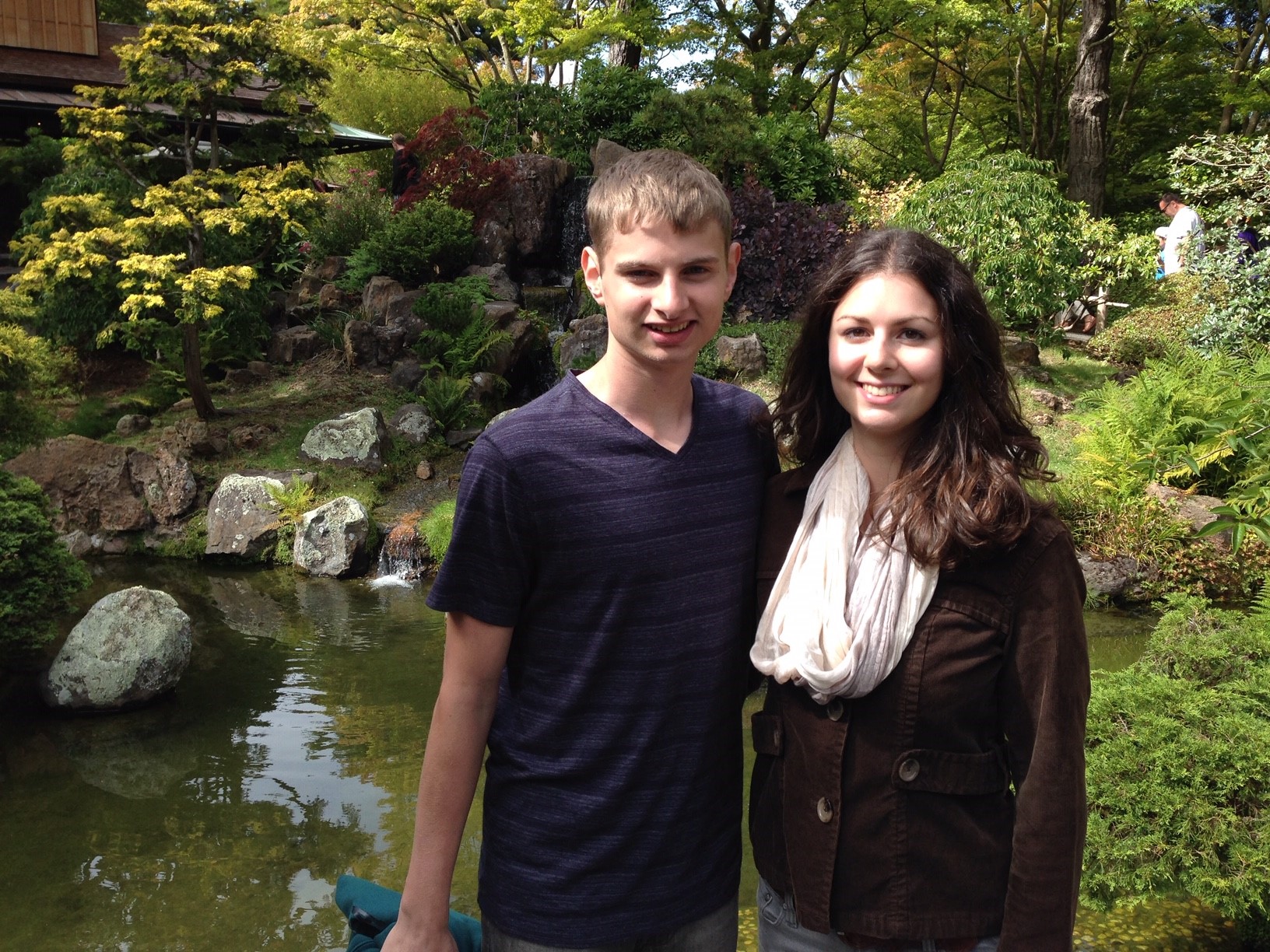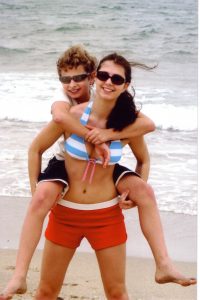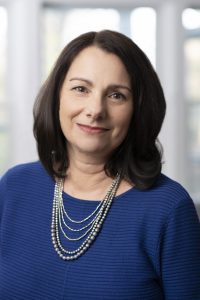4/10/2019
·Enable high contrast reading
A Sister Outside the Inner Circle but Close to the Heart

As a mother, I am both proud and sad when I think of the life my daughter Laura led over the years her brother Robby was ill. She demonstrated extraordinary compassion and poise, but I am profoundly sorry for what she endured, especially since her role was harder than it may have seemed from the outside. She stood a few steps past the center of the drama – not in the line of fire, but also not inside the inner circle.
Even as a child, Laura had the personality that would serve her in the specific challenges she faced. Watchful and whip-smart, noticing everything. A classic oldest child, Laura loved being a little mother’s helper, and entertaining her little brother with games and books.
We have adorable family video of the two of them playing together (Laura is 5 and Robby is 2), and you can hear her encourage him saying, “You can do it Robby!”
It’s hard to know whether nature or nurture played a larger role in their dynamic. Robby barreled into a room, demanding things in his particular way; while Laura was adaptable and reveled in trying new things. She seemed to understand instinctively how to be flexible to balance his rigidity, which certainly made for less sibling conflict over the years, but it also meant that Laura’s voice could be harder to hear.
 They were both teenagers when Robby’s illness first appeared, and it foreshadowed much of how Laura would need to function in those circumstances going forward – calm in a crisis, coping through uncertainty, and continually adjusting to a new normal.
They were both teenagers when Robby’s illness first appeared, and it foreshadowed much of how Laura would need to function in those circumstances going forward – calm in a crisis, coping through uncertainty, and continually adjusting to a new normal.
While away in Colorado at a summer program in 2012, Robby developed blood clots in his lungs and leg, and needed to be urgently evacuated to a Denver hospital. My husband and I jumped on a plane, leaving 19-year-old Laura home on her own. Of course we called with updates, but focused mostly on the necessary facts: Is he out of danger? What happens next? When will we come home? There wasn’t much time or bandwidth to answer many follow-up questions or help her process her feelings and fears right then. And typical for Laura, she was determined not to be an extra worry during a crisis, so when we asked how she was doing — she was always “fine.”
After two years of flare ups and hospitalizations, the illness (anti-phospholipid syndrome) finally seemed under control by the spring of 2014. Treatment was working, and Robby was set for college a couple of hours from home in Philadelphia –the same city with Laura. It wasn’t intentional, but it sure meant we could breathe easier knowing they had each other, just in case.
Looking back, it seems that our relief may have tempted fate…
In the winter of 2015, Robby’s APS came back, much stronger than before. Of the five hospitalizations during that semester, Laura was often first on the scene and by Robby’s side before we arrived. She would drop everything to be present as a caring sister and supportive daughter. She definitely wanted to be there to help, but I also know that it took time and focus from her life, and gave her a burden of worry. She didn’t want to add to her parents’ concerns, so she carried this burden largely on her own, supported by her closest friends.
After graduating that spring (summa cum laude… I can’t help bragging), Laura came home to find her first real job. The household was highly charged, and lopsided in attention. The family schedule, entertainment choices, and even dinner menus were organized around Robby’s needs based on his chemotherapy treatment, physical therapy, online classes, not to mention his unpredictable moods. Laura didn’t complain, but she did leave the room when things got heated in Robby’s angry outbursts. She hated seeing him vent his frustration so intensely at us.
Laura was struggling with a familiar challenge – it’s very hard to remain sympathetic and unconditionally loving with someone who is sometimes downright obnoxious. And it is unnerving to face so much uncertainty about the future well-being of that same loved one.
People often comment about how similar Laura and I are. It’s true, we look alike and share many interests and abilities. But temperamentally, Laura is much more like her father. She is eminently capable, but doesn’t need to be out front, and actually prefers to watch first and jump in when she sees an opening. She abhors conflict, and is adept at diffusing a situation with calm kindness and wry humor. It’s easy to admire how even-keeled she remains even under enormous pressure – but look closer, and you might catch the tiny twitch of stress that belies the effort it costs her.
During these fraught times, we were grateful for Laura’s special gift for connecting with her brother. She could make him laugh (even at himself!) with a sarcastic comment accompanied by just the right smile. She found ways to engage him in activities that would spark his interest and distract him from the struggles of his daily life – a shopping trip for new shoes, a game of cards, a silly movie. Robby didn’t feel the need to rebel against Laura’s attention – on the contrary, he enjoyed sharing her world as a fellow young adult. I like to think that their connection brought comfort to them both. Laura wanted to spend time with her brother, and Robby always felt better for her lighthearted gestures of love.
As parents we wanted to keep Laura updated about her brother’s status, but we also needed to preserve his privacy. Laura wasn’t part of the initial discussion with doctors, which meant her debrief talks with us were secondhand, and sometimes limited. So she asked only a few questions, and prioritized being helpful, rather than garnering support for herself. Brad and I could always lean on each other, but with no other sibling to share the same perspective, Laura could sometimes feel isolated.
And like her father, Laura needed to sustain focus for her own life while her brother was ill – from college through her first job as a teacher. It was enormously challenging to keep up with everyday life and work while something was profoundly wrong in her family, but Laura managed with pragmatism and sensitivity. Her grace under pressure was incredibly valuable to all of us during that period. Laura could leave a full-day at work and come home to help cook dinner for the family, regale us with stories about her students, or stay quietly on the sidelines when tensions were high.
From her vantage point, Laura had a clear-eyed understanding that her brother’s struggle was dangerous, and that his life was at stake.
The weight of this knowledge seeped into everything in our family life, changing all of us forever. Through her experience, Laura learned lessons that most people don’t face until much later in life, if at all. She likes to say now that very few things qualify for an actual “big deal”, and she knows it’s not worth worrying about “little deals”. This is not the blithe breeziness of youth, but a deep understanding of how precious life is, and what is truly most important. This insight inspires her to commit her time and effort to things that matter – like being a passionate educator, or a steadfast friend.
Ultimately, I have made peace with the regret I feel that her path was so difficult, and I can see that it is part of what made her the extraordinary young woman she was and is. The most arduous aspects of her story strengthen her innate capacity, and that is a gift for everyone who will cross her path in the future. Laura remains one of the most thoughtful, grounded, and wisest people I know – Robby was lucky to have her for a sister, and I am lucky to call her my daughter.
 Caryn Anthony is a nonprofit consultant and executive coach from Silver Spring, MD, and is also a volunteer member of the Patient and Family Advisory Council for Children’s National Medical System. She is the author of “Any Way the Wind Blows,”—a blog geared for families raising a child with a significant medical condition. Her writing has also appeared in The Huffington Post, Grown and Flown, and Modern Loss.
Caryn Anthony is a nonprofit consultant and executive coach from Silver Spring, MD, and is also a volunteer member of the Patient and Family Advisory Council for Children’s National Medical System. She is the author of “Any Way the Wind Blows,”—a blog geared for families raising a child with a significant medical condition. Her writing has also appeared in The Huffington Post, Grown and Flown, and Modern Loss.


